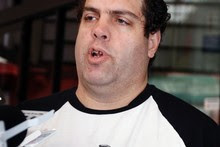 Image via WikipediaKiwi blogger may appeal his conviction for breaching suppression orders...
Image via WikipediaKiwi blogger may appeal his conviction for breaching suppression orders...Kiwi blogger Cameron Slater is likely to appeal his conviction and fines and costs of nearly $8000 for breaching suppression orders.
Slater was convicted of nine of the 10 charges he faced -- eight of breaching non-publication orders for several high-profile offenders and one of naming a victim in a sexual abuse case. The tenth case was thrown out.
Judge David Harvey fined Slater $750 and ordered him top pay court costs of $130 on each of the nine cases after rejecting submissions from his lawyer, Gregory Thwaite, that there was no case to answer.
He told Slater the internet allowed everyone to become a publisher but with that came an obligation to be accountable and responsible.
"The silent majority is no longer silent."
He said Slater had been using the internet to mount a political campaign to change the law regarding suppression orders and had deliberately published names knowing the suppression orders existed.
"You stepped over the line when you chose to publish names that were the subject of non-publication orders."
He said Slater set himself up on his blog site as judge and jury and knowing the non-publication order had been issued, he was willing to flout the law.
"There was no remorse, it was carefully planned and he knew exactly what he was doing."
During the hearing earlier today Judge Harvey and Mr Thwaite had a long legal debate over the validity of suppression orders.
Mr Thwaite said there was no case to answer because the suppression orders were invalid for a number of reasons. These included that Slater had not used the exact names of the accused as they appeared on court documents.
He also submitted Judge Harvey had the right to overturn another judge's suppression orders although the judge rejected that.
"I can't revisit what another judge has done.
"I can't say the order should not have been made -- not guilty".
He said if he did that he would be "bringing the entire system of justice into disrepute."
In his finding Judge Harvey said it was about whether a person breached the law using the internet.
"It is not a case about whether or not the law should allow non-publication orders. That debate must take place in another forum," he said.
Outside court Slater said he had "copped a flogging as best they can with a wet bus ticket."
He said he was not remorseful and had no regrets, but when asked if he would continue to flout the law, replied: "We'll see."
He said he had a few people who would underwrite his fines.
He said he did not qualify for legal aid because he had been charged under the Summary Proceedings Act.
His lawyer had advised him to appeal and he would discuss that with him."
This not a case of a blogger breaching the law for ethical reasons. Slater has his own agenda, whatever it may be.




